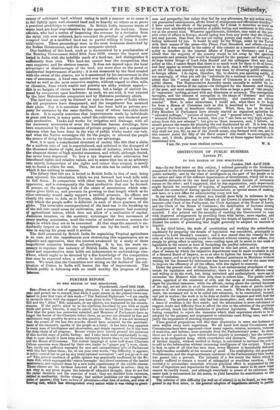FURTHER REFORM.
To THE EDITOR OF THE SPECTATOR.
Camberwell, April 24th 1848.
8m.—Even at the risk of appearing obtrusive, I am induced again to address yeti: and permit me to remark, that while I quite concur in the general views con- tained in your first topic of this week—" The National Nigh tmare "—I arm unable to reconcile them with the support you have given to the "Government Seeurity " Bill and the "Alien" Bill; measures, in my opinion, not warranted by the circum- stances If the public mind be in the condition described by you with so much truth and power, wherein, it may be asked, was the necessity for these two bills? Now that the panic has somewhat subsided, and Members of Parliament have no longer the horror of the Chartists before them, an answer not dictated by fear and excitement may possibly be given to this question. But, Sir, it was not necessary that the events of the last two months should have occurred for the ascertain- Meat of the excessive apathy of the people as a body: it has been long apparent to every man of intelligence and observation, and deeply regretted, for it has been the drag-chain of all progress. Recent events have merely proved the existence of this morbid state of public feeling; and I take leave most emphatically to say, that to none should it have been more intimately known than to our Government and the House of Commons. The violent language of some half-dozen Chartists (whose speeches were likened by their own leader to "ginger pop") were, there- fore, surely not sufficient warranty for new and extraordinary acts of Parliament with this fact before them; for, to use your own words, "the difficulty, it appears, IS not to control but to get up any truly national movement"; and you go on to say -s-" This general tendency of 'public opinion was practically confirmed by the Re- form Bill, which expunged the rotten boroughs' and direct nominees of the landed aristocracy, and replaced them by a new town constituency of the middle classes. Those classes are the furthest removed of all from impulse to action: they do not obey in any great degree the behests of educated thought, they do not feel the ruder instincts and the coercion of want: they are shielded from extremes, settled in mediocrity, dislike change, feel neither ambition nor the rougher im- pulse of passion; they have no love of adventure—that love of action, and even of braving risk, which has distinguished every nation while it was rising in great- ness and prosperity; but rather they feel for any adventure, for any action with- out guaranteed consequences, all the dread of strangeness and effeminate timidity." I have quoted the whole of the paragraph, for I think it describes as truly as it does most admirably the condition of public feeling and sentiment in this coon_ try at the present time. Whatever apprehension, therefore, may exist at the pre- sent crisis of affairs in Europe, should spring less from any power that the Chart, ists may possess, than from the use our ruling powers may make of the state of feeling indicated by you. It would be only for the Whigs, aided by the Tories with their organs of the press—the Times, Post, Standard, and others—to put forth that it was essential to the safety of this country as a measure of defensive policy to interfere in the internal affairs of France or Germany; and I aro afraid that the majority of the country would be led away by the specious arguments and pretexts that would be employed for the purpose: and although I do hope better things of Lord John Russell and his colleagues than any such policy as this, I cannot forget that there is so much work for them to do at home, and they appear so utterly incompetent to the task, that it will be impossible to get rid of this task scarcely in any other way than by diverting public attention to foreign affairs. I do regret, therefore, Sir, to observe you speaking coldly, it not sneeringly, of what you call the "substitute for a national movement" You admit that the " actual state of the House of Commons is a scandal and a public shame. The Representative Assembly meets annually to exhibit its in- efficiency in the service of the nation—its disregard for the interests and wishes of the poor, and most numerous classes, who form so large a part of the people: It represents' nothing,at least with any directness or accuracy. The manageable boroughs, and the element of corruption in the shape of 'freemen' and other electoral mercenaries, destroy all authenticity, and constitute an odious scandal." Now, in sober earnestness, I would ask, what there is to hope for from a House of Commons such as this is described to be? Certainly nothing of a great or beneficent character. What, then, has to be done? Fifty Members of Parliament have alreadz started an organized agitation for "extended suffrage," "revision of taxation, and "general reform," and, I hope, "triennial Parliaments." You remark, that you "can form no very high expect- ations from this new attempt": but give us those measures, and, I believe, we should possess the means for attaining the end desiderated by alL It is true that at present there is no plan before the public,—which is much to be regretted; but why shall not you, Sir, as one of the fourth estate, step forward with one, and in this manner assist the fifty of the third estate? this would be encouraging to them, and, I think, pleoeing to your readers, who at times appear fated to mis- understand you.
I am, Sir, your most obedient servant, W. S.


























 Previous page
Previous page